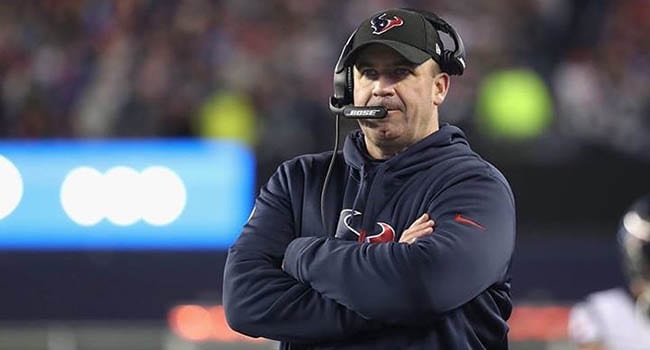 We’re in the heart of the football malpractice season. Across the frozen tundras, National Football League coaches are being overwhelmed by the pressure of making key calls during the post-season.
We’re in the heart of the football malpractice season. Across the frozen tundras, National Football League coaches are being overwhelmed by the pressure of making key calls during the post-season.
On Saturday, Houston Texans coach Bill O’Brien was like a punch-drunk fighter from the very first quarter. Quickly down 7-0 after Buffalo drove on their first possession, the panicky Texans coach wasted a timeout and a challenge on his team’s first possession over a pass interference call he couldn’t win.
But he was just warming up. After his defence had stifled the Bills late in the fourth quarter, O’Brien’s offence was left with a fourth-and-one while leading by three. He could punt, try a 47-yard field goal or get stuffed on fourth down.
Instead of pinning Buffalo deep in its zone with just 1:06 left or going up by six, O’Brien chose getting stuffed. Buffalo immediately rolled into field-goal position on an 11-play drive, tying the game with seconds left.
Buffalo Bills coach Sean McDermott was no better. In the road game, he settled for three field goals inside the 40-yard line rather than hammer home the clear advantage his team held in the first half. And his clock management at the end of both halves boggled the mind as he let precious seconds tick away.
On Sunday, it was multiple offender Sean Payton’s turn. The head coach of the New Orleans Saints somehow mismanaged his timeouts in both halves. Very late in the second half, his failure to call a timeout cost his team 40 seconds while waiting for Minnesota to punt. That left them only time for a long field goal to send the game to overtime. In overtime, his team never saw the ball as the Vikings eliminated the Saints.
All of this led writer Bill Simmons to ask, “So … why didn’t the Saints call timeout there? They lost 40 seconds plus the two-minute warning. That was inexplicable even before it happened.”
There was hope for better coaching decisions in the New England/Tennessee game. Titans coach Mike Vrabel schooled his mentor Bill Belichick late in the fourth quarter, using a loophole in the rules to bleed 1:30 off the clock, denying the Patriots the ball.
In Baltimore, Ravens coach John Harbaugh is now employing an on-field analyst to advise him on game strategy and odds.
But nothing much has changed since I wrote about lapses in coaching judgment a year ago.
Then, the Saints had the ball deep in Los Angeles Rams territory with just 1:58 left in a 20-20 tie. The Rams had just two timeouts left. If Payton ran on three consecutive plays, he could have kicked the go-ahead field goal with about 40 seconds left on the clock.
Instead, he chose to pass – unsuccessfully – on first down, allowing the Rams to keep a timeout. After a run on second down, he chose to pass again! When the Saints were cheated of a pass interference call on third down (again stopping the clock), they kicked the field goal to go ahead, now leaving the Rams 1:41 to respond.
And the Rams did respond, forcing overtime and ultimately winning a trip to the Super Bowl.
If coaching had a capital offence, Payton committed it by ignoring the obvious probabilities. In any reasonable game strategy, he failed miserably. This gaffe has been obscured by the pass interference mess and forgiven by a platoon of NFL mastodons who think coaches should go with their guts in these situations.
In truth, if you have a tool to help you win games (especially championship games), it’s gross negligence to wing it.
The NFL and college football are overpopulated by coaches who refuse to adopt the algorithms and data that tell them what’s the logical play in the heat of the the moment.
Fourth-down percentage, goal-line strategy, timeout odds – statistics show the way clearly.
But because these probabilities aren’t generated by an old pal, the top coaches in the NFL (and, let’s face it, all sports) refuse to bow to reason. Like Payton, they believe there’s mystery in the play calls that they can summon when time gets tight.
Remarkably, almost all owners – who profess a willingness to do everything they can to win – put up with this nonsense. They buy in to the bromides about trusting coaches.
But why not have game strategists to guide coaches in stressful moments?
Between the offensive and defensive strategies, the personnel decisions and the noise, it’s easy for a coach to shortchange probability. Having someone instantly tell them to make the easy choice, not the testosterone-choked mistake, can win a game or two a year.
As I’ve said before, you can get with the future or let coaches bomb out.
Troy Media columnist Bruce Dowbiggin career includes successful stints in television, radio and print. A two-time winner of the Gemini Award as Canada’s top television sports broadcaster, he is also the publisher of Not The Public Broadcaster.
The views, opinions and positions expressed by columnists and contributors are the author’s alone. They do not inherently or expressly reflect the views, opinions and/or positions of our publication.

